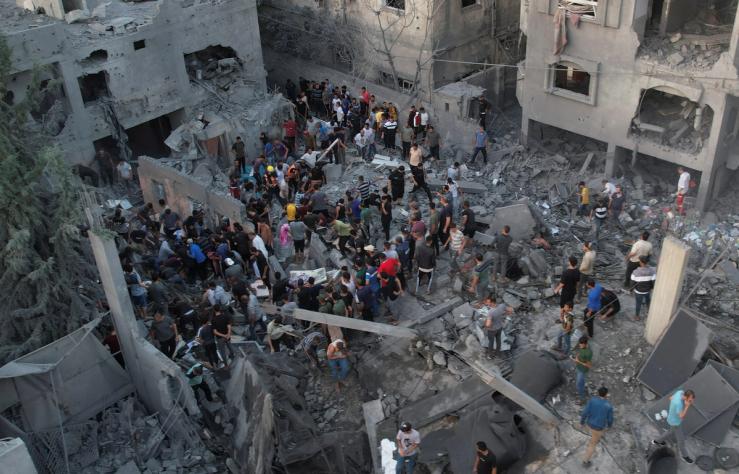The News
The escalating crisis in the Middle East looks likely to hamper hopes of strong economic recovery in many of Africa’s largest economies.
The conflict, which was triggered by a large-scale deadly attack by Palestinian militant group Hamas on Israel on Oct. 7, has so far claimed nearly 5,000 lives in 11 days. It threatens to pull in multiple other countries in the region and comes on top of the significant impact of the 20-month long Russian invasion of Ukraine which severely disrupted food supply chains to many African nations. This has caused food shortages and wider inflationary effects in countries which had not fully recovered from the economic damage caused by the global pandemic.
Long-term Africa watchers now worry the continent will slip down the priority list of major nations like the United States even as the continent seeks support with everything from regional geopolitical challenges to battered economies mired in debt and facing weakened currencies.
Know More
The International Monetary Fund and the World Bank have lowered their economic growth forecasts for Africa in 2023, to 3.3% and 2.5% respectively. The IMF found the average debt ratio in sub-Saharan Africa has almost doubled in just a decade — from 30% of GDP 10 years ago to almost 60% of GDP by the end of 2022. Rising interest rates have made it costlier to repay this debt.
The first concern for African countries about the impact of the conflict in the Middle East will be the impact on oil prices, especially for countries that are oil importers. “On the assumption that prices are going to reach $90 to $95, this will hit countries like Kenya but will also help secure oil producers like Angola and Nigeria,” said economist Charles Robertson of FIM Partners in London. “So African oil exporters become the safe havens for suppliers for parts of the global economy.”
Yinka’s view
When U.S. President Joe Biden declared he was “all in” on Africa during last December’s U.S-Africa Leaders Summit, there was a hope that the United States would start to give greater priority to African affairs. This was especially because it was framed as being in America’s self-interest for its rivalry with China, particularly with regards to the supply of so-called “green minerals’ needed for the transition away from fossil fuels.
As part of the new U.S.-Africa era there were calls for Biden to visit the continent which he acknowledged and his team promised would happen this year. It’s important to acknowledge that an unprecedented number of top U.S. officials have visited the continent this year, including the treasury secretary and the vice president, yet the symbolism of a presidential tour is not to be dismissed. The chances of such a visit this year are slimmer now and such a trip by Biden in 2024 would be unlikely since it’s a reelection campaign year.
The Israel-Hamas war will effectively push Africa further down a growing priorities list for the United States, said W. Gyude Moore, senior fellow at Center for Global Development, speaking from Beijing. “Development spending can be “justifiably” diverted,” he said. “The global attention span is limited.”
Hannah Ryder, CEO of Development Reimagined makes a similar point about some of the aid to poorer countries in the region potentially falling victim to a “zero sum game” as wealthier countries put more funds towards backing Israel militarily. “It’s likely that military spending will go up, putting pressure on humanitarian and other aid resources in African countries, which may be challenging for some,” said Ryder.
The View From Kenya
Leaders in Kenya have raised concerns that oil prices could rise even higher due to the Middle East conflict. Fuel prices in Kenya hit an all time high last week following a review of pump prices, hurting Kenyans pockets and causing widespread frustration on the cost of living.
“To understand the economic situation in which we are, we have to take into account the role of the dollar in the equation,” Mbui Wagacha, former economic advisor to Kenya’s presidency, told Semafor Africa, adding that the imposition of oil trade sanctions by the U.S. on Russia in an attempt to squeeze them out of the war has had a spillover effect on African countries.
— Muchira Gachenge in Nairobi
Room for Disagreement
Amb. J. Peter Pham, a former U.S. special envoy for the Sahel region, argues African leaders have much more responsibility when it comes to concerns that Africa might be “slipping” in strategic relevance. “The blame lies less with global leaders ignoring the continent than with all too many of Africa’s so-called leaders once again not missing an opportunity to showcase their moral bankruptcy and intellectual incoherence — and thus reminding everyone of why they should be ignored,” said Pham. He was particularly scathing about South Africa’s Cyril Ramaphosa calls to broker peace between Israel and Hamas “despite his parliament voting last year to downgrade diplomatic relations with Israel and his foreign minister calling upon the United Nations to declare Israel an ‘apartheid state’.”


